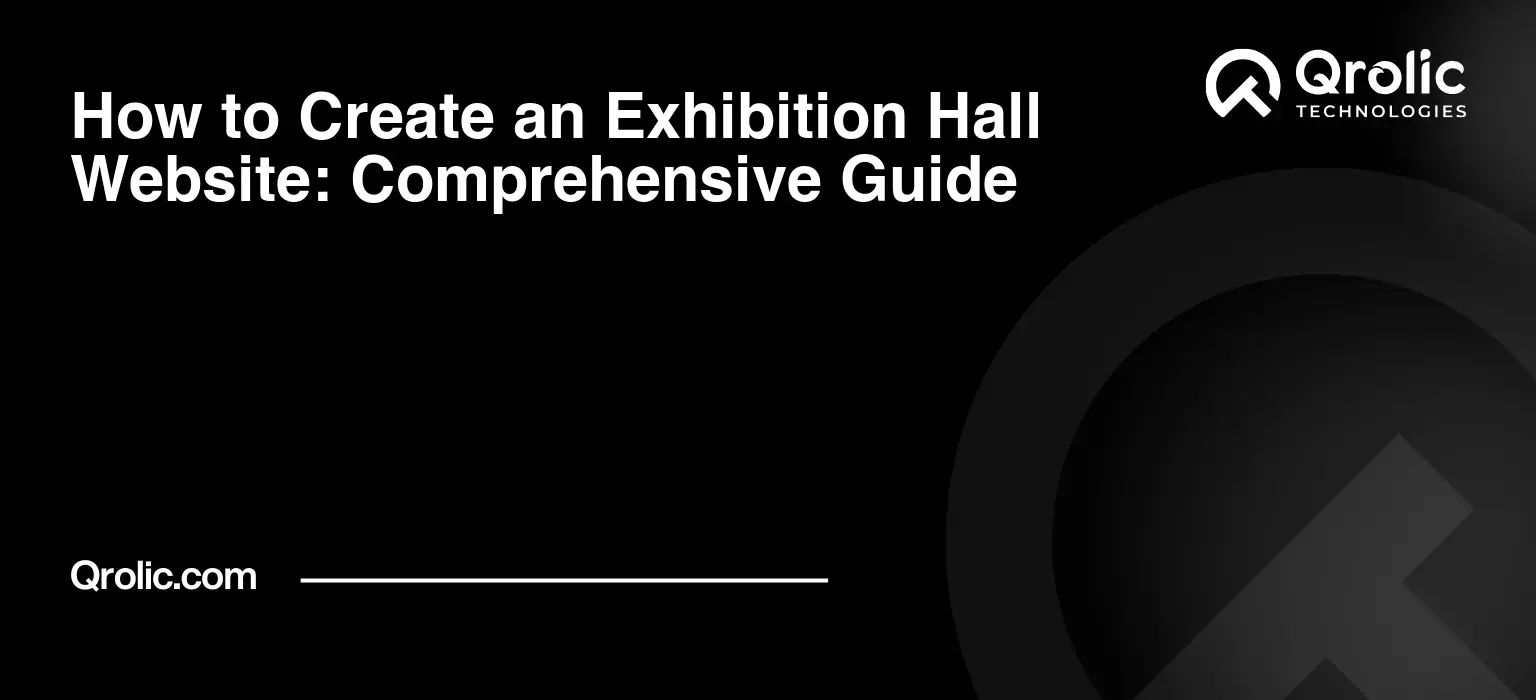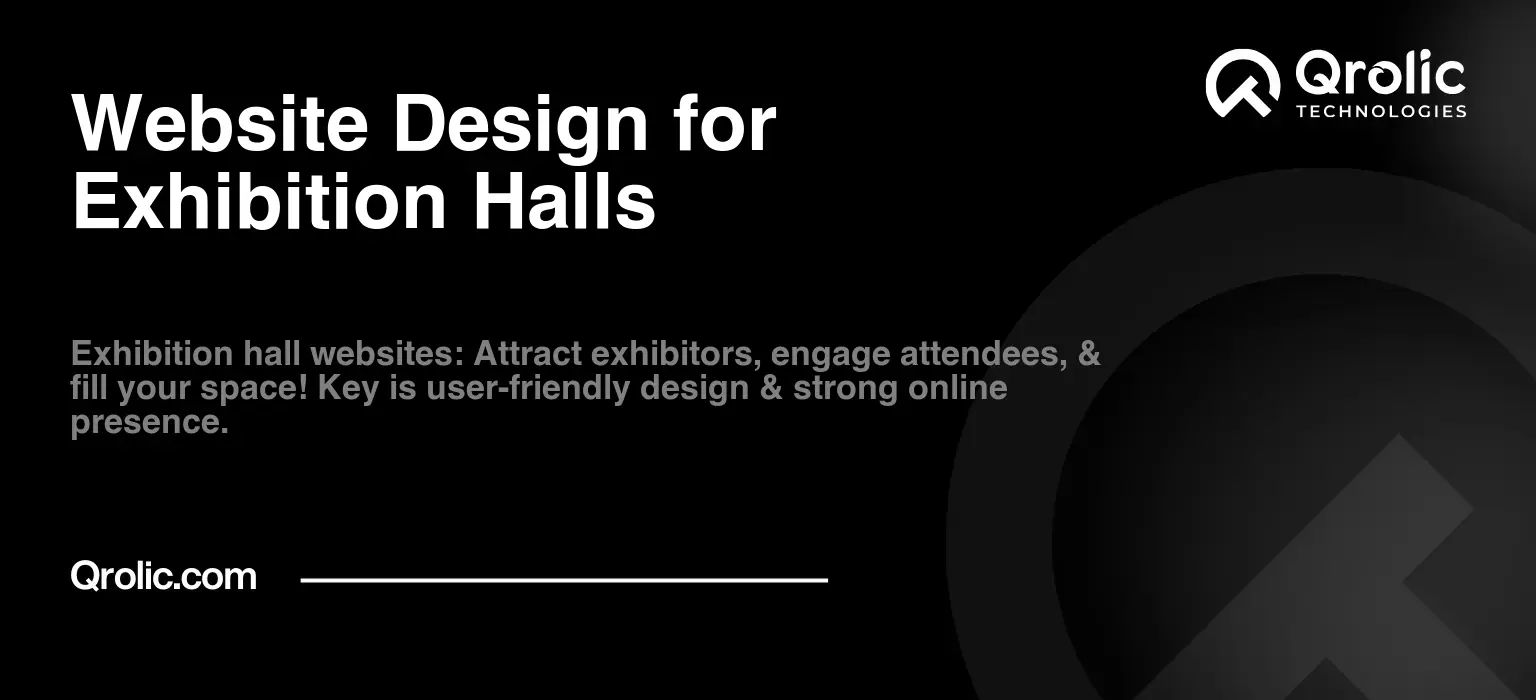Quick Summary:
- A great website boosts your hall’s visibility and bookings.
- Plan content, design for users, and pick the right tools.
- Optimize for search engines and promote widely online.
- Regularly maintain and secure your website for success.
Table of Contents
- Understanding the Why and What of an Exhibition Hall Website
- Why Your Exhibition Hall Needs a Stellar Website
- What Makes a Great Exhibition Hall Website?
- Planning Your Exhibition Hall Website: A Strategic Blueprint
- Defining Your Target Audience
- Setting Clear Goals and Objectives
- Defining Your Website’s Structure and Content
- Choosing the Right Platform and Tools
- Selecting a Content Management System (CMS)
- Selecting a Web Hosting Provider
- Essential Plugins and Tools
- Designing an Engaging User Experience
- Creating a Visually Appealing Website Design
- Optimizing for Mobile Responsiveness
- Implementing Clear Navigation and Information Architecture
- Crafting Compelling Content and Calls to Action
- Search Engine Optimization (SEO) for Exhibition Halls
- Keyword Research: Finding the Right Terms
- On-Page Optimization: Making Your Website Search-Friendly
- Off-Page Optimization: Building Authority and Trust
- Local SEO: Targeting Your Geographic Area
- Promoting Your Website and Driving Traffic
- Social Media Marketing
- Email Marketing
- Content Marketing
- Paid Advertising
- Monitoring and Maintaining Your Website
- Website Analytics: Tracking Your Progress
- Website Security: Protecting Your Data
- Website Updates: Keeping Your Content Fresh
- Website Maintenance: Ensuring Smooth Operation
- Qrolic Technologies: Your Partner in Digital Success
- Conclusion: Embracing the Digital Future of Exhibitions
Understanding the Why and What of an Exhibition Hall Website
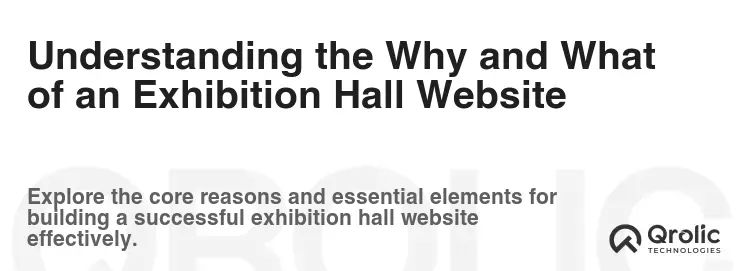
Why Your Exhibition Hall Needs a Stellar Website
In today’s digital landscape, a website isn’t just an option; it’s the cornerstone of your exhibition hall’s visibility and success. It’s your digital storefront, your 24/7 information hub, and your primary tool for engaging with potential exhibitors and attendees. Let’s delve into why a well-crafted website is absolutely crucial:
- Enhanced Visibility and Reach: The internet is the first place people turn when looking for information. A website ensures your exhibition hall is discoverable by a global audience, significantly expanding your reach beyond geographical limitations. Think of it as your digital billboard, constantly promoting your venue to the world.
- Establishing Credibility and Trust: A professional website projects an image of competence, reliability, and attention to detail. It assures potential exhibitors and attendees that your exhibition hall is a reputable and trustworthy venue for their events. Think of it as your online resume, showcasing your capabilities and accomplishments.
- Streamlining Communication and Information Dissemination: Your website serves as a central repository for all essential information about your exhibition hall, including venue specifications, upcoming events, contact details, and booking procedures. This eliminates the need for constant email exchanges and phone calls, saving you valuable time and resources.
- Generating Leads and Driving Bookings: A well-designed website can actively attract potential exhibitors and attendees, guiding them through the booking process and encouraging them to secure their space or register for upcoming events. Consider it your online sales team, working tirelessly to generate leads and convert them into bookings.
- Improving Customer Experience: By providing a user-friendly and informative online experience, you can significantly enhance the overall satisfaction of your exhibitors and attendees. A positive online experience translates into increased loyalty and repeat business. Think of it as your virtual concierge, providing personalized assistance and guidance to your website visitors.
- Data Collection and Analytics: A website allows you to track visitor behavior, analyze website traffic, and gain valuable insights into your target audience. This data can be used to optimize your website content, improve your marketing strategies, and enhance the overall effectiveness of your exhibition hall’s operations.
- Cost-Effective Marketing: Compared to traditional marketing methods, a website offers a highly cost-effective way to promote your exhibition hall and reach a wider audience. You can leverage search engine optimization (SEO), social media marketing, and email marketing to drive traffic to your website and generate leads without breaking the bank.
What Makes a Great Exhibition Hall Website?
A great exhibition hall website is more than just a pretty face. It’s a carefully crafted tool that serves specific purposes and delivers tangible results. Here’s what distinguishes a top-performing exhibition hall website:
- Clear and Concise Information: Visitors should be able to quickly and easily find the information they need, whether it’s venue specifications, upcoming events, or contact details. Avoid jargon and technical terms, and use clear and concise language that is easy to understand.
- User-Friendly Navigation: The website should be easy to navigate, with a logical structure and intuitive menu options. Visitors should be able to find what they’re looking for without getting lost or frustrated.
- Visually Appealing Design: The website’s design should be visually appealing and consistent with your brand identity. Use high-quality images and videos to showcase your exhibition hall and create a positive first impression.
- Mobile Responsiveness: In today’s mobile-first world, it’s essential that your website is fully responsive and optimized for viewing on all devices, including smartphones and tablets.
- Search Engine Optimization (SEO): Your website should be optimized for search engines to ensure that it ranks well in search results and attracts organic traffic. This involves using relevant keywords, optimizing website content, and building high-quality backlinks.
- Call to Actions (CTAs): The website should include clear and compelling CTAs that encourage visitors to take action, such as booking a space, registering for an event, or contacting your team.
- Fast Loading Speed: A slow-loading website can frustrate visitors and negatively impact your search engine rankings. Optimize your website for speed by compressing images, caching content, and using a reliable hosting provider.
- Security: Protect your website and visitors’ data by implementing robust security measures, such as SSL encryption and regular security updates.
- Accessibility: Ensure your website is accessible to users with disabilities by following accessibility guidelines and implementing assistive technologies.
Planning Your Exhibition Hall Website: A Strategic Blueprint
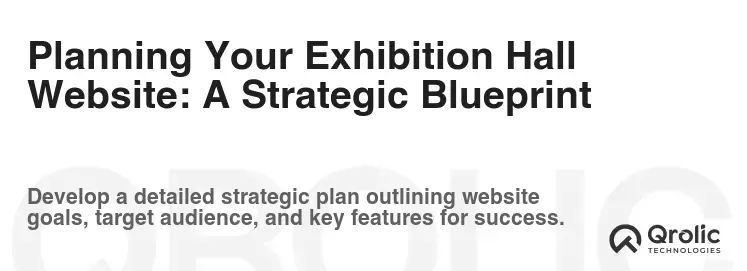
Defining Your Target Audience
Before you start designing your website, you need to clearly define your target audience. Who are you trying to reach? What are their needs and expectations? Understanding your target audience will help you tailor your website content, design, and functionality to effectively attract and engage them. Consider these key audience segments:
- Exhibitors: These are the businesses and organizations that rent space in your exhibition hall to showcase their products and services. Their primary concerns are venue suitability, cost-effectiveness, and potential ROI.
- Attendees: These are the individuals who visit your exhibition hall to attend events, network with industry peers, and learn about new products and services. Their primary concerns are event relevance, ticket prices, and overall experience.
- Event Organizers: These are the companies and individuals that plan and manage events in your exhibition hall. Their primary concerns are venue capacity, logistical support, and marketing assistance.
- Sponsors: These are the businesses and organizations that provide financial support for events in your exhibition hall in exchange for brand visibility and marketing opportunities. Their primary concerns are brand exposure and target audience alignment.
For each audience segment, create detailed personas that include their demographics, interests, pain points, and online behavior. This will help you understand their needs and tailor your website content accordingly.
Setting Clear Goals and Objectives
What do you want to achieve with your website? What specific outcomes are you hoping to achieve? Setting clear goals and objectives will provide a roadmap for your website development process and help you measure your success. Consider these potential goals:
- Increase Website Traffic: Drive more visitors to your website through search engine optimization, social media marketing, and other promotional channels.
- Generate Leads: Capture leads from potential exhibitors and attendees through contact forms, email subscriptions, and online registrations.
- Increase Bookings: Increase the number of bookings for your exhibition hall by showcasing venue specifications, promoting upcoming events, and streamlining the booking process.
- Improve Customer Satisfaction: Enhance the overall satisfaction of your exhibitors and attendees by providing a user-friendly and informative online experience.
- Enhance Brand Awareness: Increase brand awareness for your exhibition hall by showcasing your unique features, promoting your events, and engaging with your target audience.
Make sure your goals are SMART: Specific, Measurable, Achievable, Relevant, and Time-bound. For example, instead of saying “Increase website traffic,” set a goal like “Increase website traffic by 20% in the next six months.”
Defining Your Website’s Structure and Content
With your target audience and goals in mind, you can start planning the structure and content of your website. Consider these essential pages:
- Homepage: This is the first page visitors will see, so it’s crucial to make a strong first impression. The homepage should clearly communicate your exhibition hall’s value proposition, showcase your unique features, and provide easy access to key information.
- About Us: This page should tell your exhibition hall’s story, highlighting your history, mission, values, and team. It’s an opportunity to build trust and credibility with your audience.
- Venue Specifications: This page should provide detailed information about your exhibition hall’s facilities, including floor plans, capacity, technical specifications, and available services.
- Upcoming Events: This page should showcase your upcoming events, including dates, times, descriptions, and registration details.
- Past Events: This page should highlight your past events, showcasing your success stories and demonstrating your experience in hosting various types of events.
- Services: This page should describe the services you offer to exhibitors and attendees, such as event planning, marketing support, and technical assistance.
- Testimonials: This page should feature testimonials from satisfied exhibitors and attendees, providing social proof of your exhibition hall’s value.
- Contact Us: This page should provide your contact information, including phone number, email address, and physical address. It should also include a contact form for visitors to submit inquiries.
- Blog: A blog can be a valuable tool for sharing industry insights, promoting upcoming events, and engaging with your target audience.
For each page, create a detailed content outline that includes the main topics, keywords, and calls to action.
Choosing the Right Platform and Tools
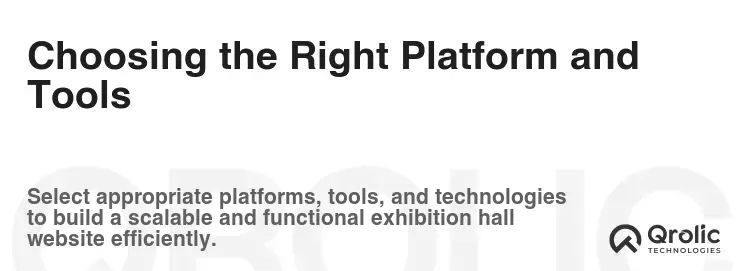
Selecting a Content Management System (CMS)
A Content Management System (CMS) is a software application that allows you to create, manage, and publish content on your website without requiring technical expertise. Choosing the right CMS is crucial for ensuring your website is easy to maintain, update, and scale. Here are some popular CMS options for exhibition hall websites:
- wordpress: WordPress is the most popular CMS in the world, known for its flexibility, ease of use, and extensive plugin library. It’s a great option for exhibition hall websites of all sizes, offering a wide range of themes and plugins specifically designed for event management.
- Joomla: Joomla is another popular CMS that offers a balance of flexibility and ease of use. It’s a good option for exhibition hall websites that require more advanced features, such as user management and access control.
- Drupal: Drupal is a powerful CMS that’s best suited for complex websites with specific requirements. It offers a high degree of customization and control, but it requires more technical expertise to manage.
- Wix & Squarespace: These are website builders that offer drag-and-drop functionality and pre-designed templates. They are user-friendly and require no coding knowledge, making them a good option for smaller exhibition halls with limited technical resources. However, they offer less flexibility and customization compared to WordPress, Joomla, and Drupal.
Consider your technical skills, budget, and website requirements when choosing a CMS. WordPress is generally the best option for most exhibition hall websites due to its ease of use, flexibility, and extensive plugin library.
Selecting a Web Hosting Provider
Your web hosting provider is responsible for storing your website’s files and making them accessible to visitors online. Choosing a reliable web hosting provider is crucial for ensuring your website is fast, secure, and always available. Here are some factors to consider when selecting a web hosting provider:
- Uptime: Choose a hosting provider with a high uptime guarantee (at least 99.9%). This ensures your website is available to visitors most of the time.
- Speed: Choose a hosting provider with fast servers and optimized infrastructure. This will ensure your website loads quickly, providing a better user experience.
- Security: Choose a hosting provider with robust security measures, such as firewalls, intrusion detection systems, and malware scanning. This will protect your website from cyber threats.
- Support: Choose a hosting provider with responsive and knowledgeable customer support. This will ensure you can get help when you need it.
- Scalability: Choose a hosting provider that offers scalable resources, such as bandwidth and storage. This will allow you to easily upgrade your hosting plan as your website grows.
Some popular web hosting providers include:
- Bluehost: A popular and affordable hosting provider that’s well-suited for WordPress websites.
- SiteGround: A fast and reliable hosting provider that’s also well-suited for WordPress websites.
- HostGator: A versatile hosting provider that offers a variety of hosting plans to suit different needs.
- AWS (Amazon Web Services): A powerful and scalable cloud hosting platform that’s best suited for larger exhibition halls with complex website requirements.
Essential Plugins and Tools
Here are some essential plugins and tools that can enhance your exhibition hall website:
- SEO Plugin (e.g., Yoast SEO, Rank Math): Helps you optimize your website for search engines by providing guidance on keyword usage, meta descriptions, and other SEO best practices.
- Contact Form Plugin (e.g., Contact Form 7, WPForms): Allows you to create custom contact forms for visitors to submit inquiries.
- Event Management Plugin (e.g., The Events Calendar, Event Espresso): Helps you manage and promote your upcoming events, including registration, ticketing, and scheduling.
- Analytics Tool (e.g., Google Analytics): Tracks website traffic, visitor behavior, and other key metrics.
- Security Plugin (e.g., Wordfence, Sucuri): Protects your website from cyber threats by scanning for malware, blocking malicious traffic, and implementing security best practices.
- Caching Plugin (e.g., WP Rocket, W3 Total Cache): Improves website loading speed by caching static content.
- Image Optimization Plugin (e.g., Smush, Imagify): Compresses images to reduce file size and improve loading speed.
- Email Marketing Tool (e.g., Mailchimp, Constant Contact): Allows you to collect email addresses and send email newsletters to your subscribers.
Designing an Engaging User Experience
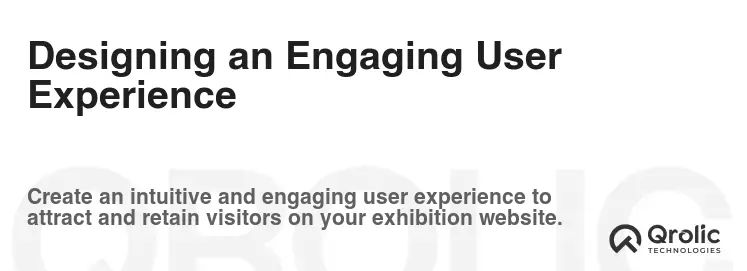
Creating a Visually Appealing Website Design
Your website’s design is the first thing visitors will notice, so it’s crucial to create a visually appealing and professional design that reflects your brand identity. Consider these design principles:
- Color Palette: Choose a color palette that is consistent with your brand identity and evokes the desired emotions.
- Typography: Choose fonts that are easy to read and consistent with your brand identity.
- Imagery: Use high-quality images and videos to showcase your exhibition hall and create a positive first impression.
- Layout: Use a clean and organized layout that is easy to navigate.
- White Space: Use white space to create visual breathing room and improve readability.
Consider hiring a professional web designer to create a custom design that is tailored to your specific needs. Alternatively, you can use a pre-designed theme from a reputable theme provider.
Optimizing for Mobile Responsiveness
In today’s mobile-first world, it’s essential that your website is fully responsive and optimized for viewing on all devices, including smartphones and tablets. This means your website should automatically adjust its layout and content to fit the screen size of the device being used.
Use a responsive theme or framework that is designed for mobile devices. Test your website on different devices to ensure it looks and functions properly.
Implementing Clear Navigation and Information Architecture
Your website should be easy to navigate, with a logical structure and intuitive menu options. Visitors should be able to find what they’re looking for without getting lost or frustrated.
- Use a clear and concise menu structure.
- Use breadcrumbs to help visitors navigate the site.
- Use internal links to connect related pages.
- Use a search bar to allow visitors to quickly find specific information.
Crafting Compelling Content and Calls to Action
Your website content should be clear, concise, and engaging. Use compelling headlines, subheadings, and body copy to capture visitors’ attention and keep them reading.
- Focus on the benefits of your exhibition hall, not just the features.
- Use strong verbs and active voice.
- Use visuals to break up the text and make it more engaging.
- Include clear and compelling calls to action (CTAs) that encourage visitors to take action.
Examples of effective CTAs include:
- Book Your Space Today!
- Register for Our Next Event!
- Contact Us for More Information!
- Download Our Brochure!
Search Engine Optimization (SEO) for Exhibition Halls
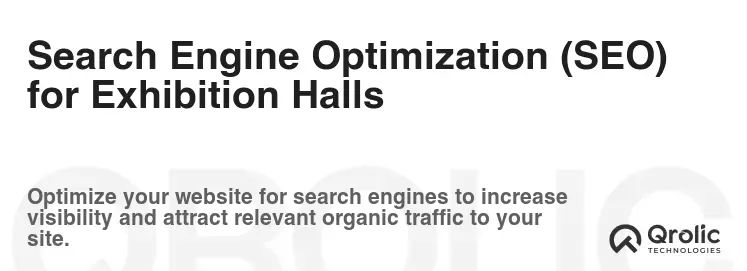
Keyword Research: Finding the Right Terms
Keyword research is the foundation of any successful SEO strategy. It involves identifying the terms that your target audience uses when searching for exhibition halls and related services online.
- Use keyword research tools (e.g., Google Keyword Planner, Ahrefs, SEMrush) to identify relevant keywords.
- Focus on long-tail keywords (longer, more specific phrases) that have lower competition.
- Consider the intent behind the keywords (e.g., informational, transactional).
Examples of relevant keywords for exhibition halls include:
- exhibition hall
- convention center
- event venue
- trade show venue
- conference center
- [city] exhibition hall
- [industry] trade show
On-Page Optimization: Making Your Website Search-Friendly
On-page optimization involves optimizing your website’s content and structure to make it more search-friendly.
- Use relevant keywords in your website’s titles, headings, and body copy.
- Optimize your website’s meta descriptions (short summaries that appear in search results).
- Use alt text for your images to describe the content of the image to search engines.
- Use internal links to connect related pages and improve website navigation.
- Ensure your website is mobile-responsive.
- Improve website loading speed.
Off-Page Optimization: Building Authority and Trust
Off-page optimization involves building authority and trust for your website by earning backlinks from other reputable websites.
- Create high-quality content that other websites will want to link to.
- Submit your website to relevant online directories.
- Participate in industry forums and online communities.
- Reach out to other websites in your industry and ask for backlinks.
- Promote your website on social media.
Local SEO: Targeting Your Geographic Area
If your exhibition hall primarily serves a local audience, it’s important to focus on local SEO.
- Create a Google My Business profile.
- Optimize your Google My Business profile with accurate and complete information.
- Encourage customers to leave reviews on your Google My Business profile.
- Use local keywords in your website’s content and meta descriptions.
- Build local citations (mentions of your business name, address, and phone number) on other websites.
Promoting Your Website and Driving Traffic
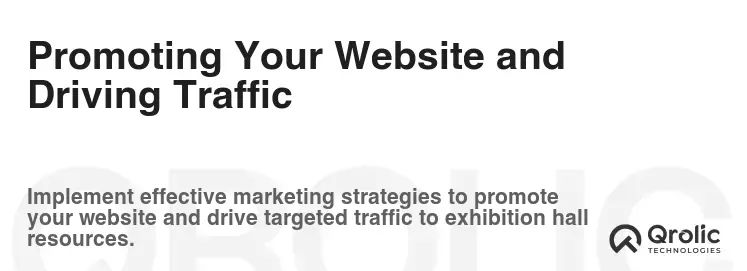
Social Media Marketing
Social media can be a powerful tool for promoting your exhibition hall and driving traffic to your website.
- Create social media profiles on relevant platforms (e.g., Facebook, Instagram, LinkedIn, Twitter).
- Share engaging content that is relevant to your target audience.
- Run social media ads to reach a wider audience.
- Engage with your followers and respond to their comments and questions.
Email Marketing
Email marketing can be an effective way to nurture leads and drive traffic to your website.
- Collect email addresses from visitors to your website.
- Send email newsletters that are informative and engaging.
- Promote upcoming events and special offers in your email newsletters.
- Segment your email list to send targeted emails to different audience segments.
Content Marketing
Content marketing involves creating and sharing valuable, relevant, and consistent content to attract and engage your target audience.
- Create blog posts, articles, infographics, and videos that are informative and engaging.
- Share your content on social media and other online channels.
- Optimize your content for search engines.
Paid Advertising
Paid advertising can be a quick and effective way to drive traffic to your website.
- Use Google Ads to target relevant keywords and reach potential customers who are searching for exhibition halls online.
- Use social media ads to target specific demographics and interests.
Monitoring and Maintaining Your Website
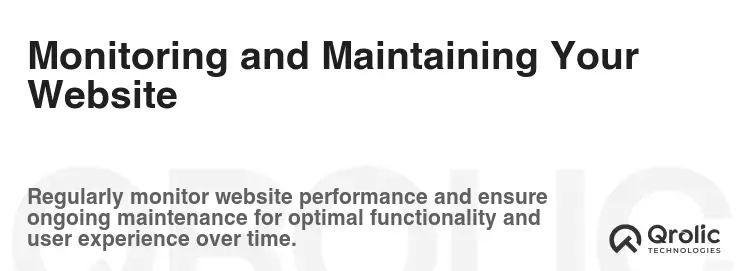
Website Analytics: Tracking Your Progress
Website analytics tools like Google Analytics allow you to track your website’s traffic, visitor behavior, and other key metrics. This data can be used to identify areas for improvement and optimize your website’s performance.
- Track your website’s traffic, bounce rate, and conversion rate.
- Analyze visitor behavior to understand how people are using your website.
- Identify which pages are performing well and which pages need improvement.
- Track the effectiveness of your marketing campaigns.
Website Security: Protecting Your Data
Website security is crucial for protecting your website and visitors’ data from cyber threats.
- Use a strong password for your website’s administrator account.
- Keep your website’s software up to date.
- Install a security plugin to protect your website from malware and other threats.
- Use SSL encryption to secure your website’s data.
- Back up your website regularly.
Website Updates: Keeping Your Content Fresh
It’s important to keep your website’s content fresh and up to date.
- Regularly update your website with new content.
- Review and update existing content to ensure it is accurate and relevant.
- Remove outdated or irrelevant content.
Website Maintenance: Ensuring Smooth Operation
Regular website maintenance is essential for ensuring your website runs smoothly and efficiently.
- Check your website for broken links and fix them.
- Optimize your website’s images to improve loading speed.
- Test your website on different devices and browsers to ensure it looks and functions properly.
- Monitor your website’s performance and identify any issues.
Qrolic Technologies: Your Partner in Digital Success
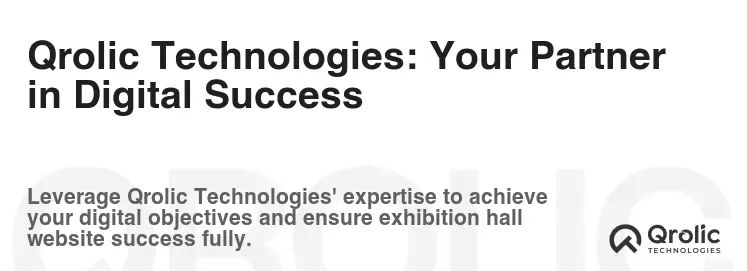
At Qrolic Technologies (https://qrolic.com/), we understand the unique challenges and opportunities that exhibition halls face in the digital world. We offer a comprehensive range of website design, development, and digital marketing services to help you create a powerful online presence and achieve your business goals.
Here’s how Qrolic Technologies can help your exhibition hall:
- Custom Website Design: We create visually appealing and user-friendly websites that are tailored to your specific needs and brand identity.
- Responsive Website Development: We ensure your website is fully responsive and optimized for viewing on all devices.
- Search Engine Optimization (SEO): We help you improve your website’s search engine rankings and drive more organic traffic.
- Social Media Marketing: We help you create and manage engaging social media campaigns to reach a wider audience.
- Content Marketing: We create high-quality content that is relevant to your target audience and helps you establish thought leadership.
- Pay-Per-Click (PPC) Advertising: We manage your PPC campaigns to drive targeted traffic to your website and generate leads.
- Website Maintenance and Support: We provide ongoing website maintenance and support to ensure your website runs smoothly and efficiently.
Why Choose Qrolic Technologies?
- Experience: We have extensive experience working with exhibition halls and other businesses in the event industry.
- Expertise: Our team of skilled designers, developers, and marketers has the expertise to deliver exceptional results.
- Customer Focus: We are committed to providing outstanding customer service and building long-term relationships with our clients.
- Results-Driven: We are focused on delivering measurable results that help you achieve your business goals.
- Affordable Pricing: We offer competitive pricing and flexible payment options to suit your budget.
Contact Qrolic Technologies today to learn more about how we can help you create a successful exhibition hall website.
Conclusion: Embracing the Digital Future of Exhibitions
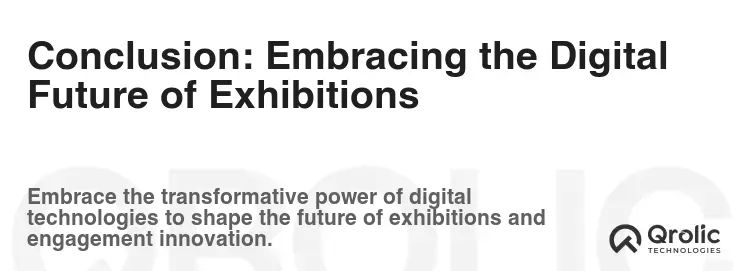
Creating an effective exhibition hall website is a significant investment that can yield substantial returns. By following the comprehensive guidance outlined in this article, you can develop a powerful online platform that attracts exhibitors, engages attendees, and drives bookings for your venue. Remember to focus on user experience, optimize for search engines, and leverage digital marketing strategies to promote your website and reach your target audience. Embrace the digital future of exhibitions and unlock the full potential of your exhibition hall with a well-crafted and strategically managed website.
